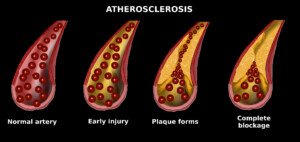Plaque in your abdomen is a strong clue that there is plaque in your heart: coronary artery disease, or “sludge” in your heart’s arteries.
When a CT abdominal scan shows very high degrees of abdominal aortic calcium, these patients are about 60 percent at risk of having CAD: coronary artery disease.
Plus, the presence of the abdominal aortic calcium (high levels) means a higher risk of death.
Not surprisingly, the absence of abdominal aortic calcium is associated with low risk of the coronary artery disease.
“The typical abdominal CT (whether or not it includes the pelvis) starts above the diaphragm and includes some of the lung base and some of the bottom of the heart,” says Brett Mollard, MD, a board certified diagnostic radiologist who specializes in abdominal imaging and nuclear medicine.
“The coronary arteries are generally at least partially visualized, particularly the right coronary artery, allowing us to see if any atherosclerotic calcifications are present.
“Coronary artery calcifications are used to help risk stratify patients for underlying coronary artery disease.
“While a CT of the abdomen won’t fully assess the coronary arteries, it can tip off an ordering provider to the presence of coronary artery calcifications and lead to further risk stratification and/or a dedicated coronary calcium screening CT.
“Occasionally, incidentally detected coronary calcifications may be the most important finding we make on an abdominal CT.”
Risk Factors for Coronary Artery Disease
- smoking, obesity and overweight (especially the “apple” shaped body)
- high fat diet
- high salt (sodium) diet
- lack of exercise
- emotional stress
- family history
- diabetes
- high blood pressure.
- untreated obstructive sleep apnea
Additional Risk Factors
- chronic sleep habits of less than six hours a night
- chronic sleep habits of more than nine hours a night
- ingestion of trans fats (manmade fat found in many foods)
- insulin resistance (forerunner of type 2 diabetes).
A less invasive but accurate diagnostic tool for coronary artery disease is the CT angiogram.
The CT calcium score is also a highly regarded diagnostic tool.


 Brett Mollard, MD
Brett Mollard, MD
























